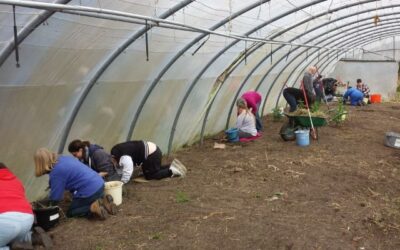Characteristics
- Established arable farm.
- Established care farm, from nursing background.
- Care farm does not contribute significantly to farm income.
- Clients gain from a structured day of activities on the farm.
- Benefit system is a barrier for clients to progress.
- Difficult to sustain care farming without proper funding.
Case study 2 is an established site where care farming has been in place for 12 years. The person running the farm had previously worked in the NHS, but was inspired by existing care farms, mainly in England that she visited, but also in Aberdeenshire, where lots of good work was happening at that time.
To the clients – this is work, some have been working at the farm for years and they gain from the structured day, but they are unlikely ever to move back into employment given their ability levels and also benefit system which supports them. Some of these clients do things that are of value to the farm, feeding the hens, or weeding, but it is important always to keep an eye and some are always under supervision.
Clients get a purpose to life, and the camaraderie you get in a workplace. Clients have to go out in all weathers to do their work and looking after animals and growing things is therapeutic. One client who is unable to weed and grow plants, likes woodwork, and makes shelters for pet lambs. Clients get enjoyment from their day on the farm. “Care farming suits old fashioned farming” In the past people with mental health issues or learning difficulties would work as farm hands, with a roof over their heads, and would get fed, and some basic pay. Nowadays these people are homeless, or are sitting at home watching TV, unable to break out of the benefit system.
There are parts of the farm are out of bounds as part of the health and safety policy. The care farm makes a risk assessment for each client. There is a need to be careful at all times on a working farm.
Each client is offered the following:
- A holistic, person -centred health assessment
- A structured health improvement plan
- A work plan based on ability and aims to achieve.
- Ongoing health coaching and mentoring from a qualified health professional
- Advice and support on condition management
- Tuition and mentoring from experienced rural skills instructors
- Access to work experience on a commercial farm within a supportive team environment
- Work conditioning and coaching
- Help with employability skills e.g. job searching, improving communication skills, confidence building, applying for jobs, CV preparation and preparing for interview.
- Referral for advice and assessment to other health professionals.
This care farm has undertaken a lot of work over the years, and is now in need of some way or remunerating the positive social outcomes being delivered, for the service to sustain itself.




